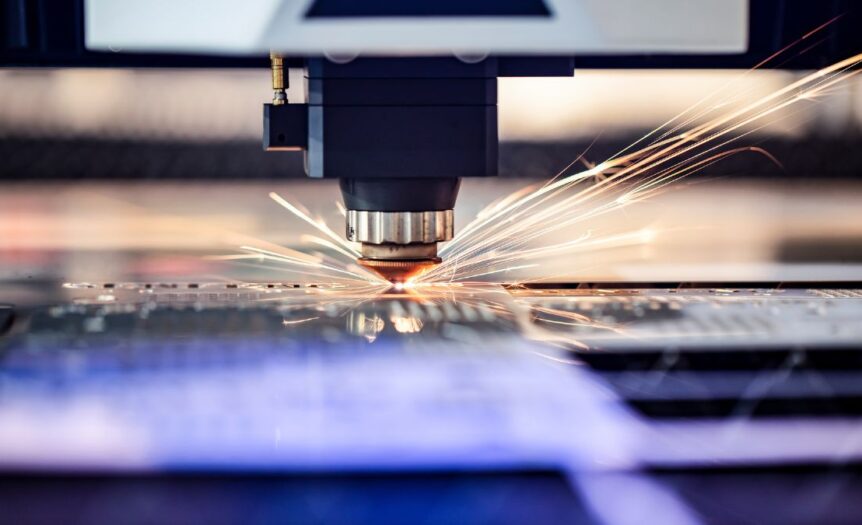Metal manufacturing is a vital industry that produces a wide range of products we use daily, from planes and cars to household appliances and electronics. However, this industry also generates significant material waste, which has economic and environmental impacts.
Let’s explore five ways to reduce material waste in metal manufacturing so that businesses can be more efficient, sustainable, and profitable.
Embrace Lean Manufacturing Principles
Lean manufacturing systematically reduces waste by optimizing production processes, minimizing inventory levels, and eliminating non-value-adding activities. By adopting lean principles in metal manufacturing, you can reduce material waste. You only produce what is necessary when needed. To implement lean manufacturing, you must identify and eliminate unnecessary steps, processes, or inventory items that add no value to the end product. This approach ensures you use resources more efficiently and minimize the scrap created.
Recycle Metal Scraps
Collecting and recycling scraps is another way to reduce material waste in metal manufacturing. Metal scraps come out during production, and if you don’t manage them properly, they can accumulate quickly, taking up valuable space and increasing costs. Recycling metal scraps reduces the amount of raw materials necessary for manufacturing, lowers energy consumption and greenhouse gas emissions, and saves money on disposal costs.
Update Your Equipment
Outdated equipment can produce lots of material waste when working with metals. Newer machines and tools are more precise and efficient, and they can reduce the amount of scrap metal produced by up to 50 percent. Adding newer machines can give lots of different benefits and add value. Knowing how something like a laser cutting machine adds value to metal fabrication can help you decide the best investment.
Implement Smart Materials Management
Smart material management involves planning and controlling material flow, storage, and transportation to minimize waste and maximize efficiency. By implementing smart material management practices, you can ensure that the right materials arrive at the right time and in the right quantity. This approach can help prevent overstocking, understocking, and material waste due to mishandling or damage during transportation.
Collaborate With Suppliers
Suppliers play a critical role in the metal manufacturing process. Collaborating with your suppliers can help reduce material waste by ensuring that they provide materials that meet your quality standards in the necessary amount. It also ensures they deliver them on time. Additionally, you can work with your suppliers to identify opportunities to improve your processes that can reduce waste and costs.
Reducing material waste is essential for maintaining sustainable and profitable operations in metal manufacturing. Implementing the above strategies can reduce material waste and create a more sustainable and efficient manufacturing process. Doing this will save money on raw materials, energy, and disposal costs while reducing your environmental impact.










 Deering Estate
Deering Estate
 Massage Envy South Miami
Massage Envy South Miami
 Calla Blow Dry
Calla Blow Dry
 My Derma Clinic
My Derma Clinic
 Sushi Maki
Sushi Maki
 Sports Grill
Sports Grill
 The Healthy Kitchen
The Healthy Kitchen
 Golden Rule Seafood
Golden Rule Seafood
 Malanga Cuban Café
Malanga Cuban Café

 Kathleen Ballard
Kathleen Ballard
 Panter, Panter & Sampedro
Panter, Panter & Sampedro
 Vintage Liquors
Vintage Liquors
 The Dog from Ipanema
The Dog from Ipanema
 Rubinstein Family Chiropractic
Rubinstein Family Chiropractic
 Your Pet’s Best
Your Pet’s Best
 Indigo Republic
Indigo Republic




 ATR Luxury Homes
ATR Luxury Homes


 2112 Design Studio
2112 Design Studio
 Hamilton Fox & Company
Hamilton Fox & Company
 Creative Design Services
Creative Design Services
 Best Pest Professionals
Best Pest Professionals
 HD Tree Services
HD Tree Services
 Trinity Air Conditioning Company
Trinity Air Conditioning Company
 Cisca Construction & Development
Cisca Construction & Development
 Mosquito Joe
Mosquito Joe
 Cutler Bay Solar Solutions
Cutler Bay Solar Solutions


 Miami Royal Ballet & Dance
Miami Royal Ballet & Dance
 Christopher Columbus
Christopher Columbus
 Pineview Preschools
Pineview Preschools
 Westminster
Westminster
 Carrollton
Carrollton
 Lil’ Jungle
Lil’ Jungle
 Frost Science Museum
Frost Science Museum
 Palmer Trinity School
Palmer Trinity School
 South Florida Music
South Florida Music
 Pinecrest Orthodontics
Pinecrest Orthodontics
 Dr. Bob Pediatric Dentist
Dr. Bob Pediatric Dentist
 d.pediatrics
d.pediatrics
 South Miami Women’s Health
South Miami Women’s Health

 The Spot Barbershop
The Spot Barbershop
 My Derma Clinic
My Derma Clinic




 Miami Dance Project
Miami Dance Project

 Rubinstein Family Chiropractic
Rubinstein Family Chiropractic
 Indigo Republic
Indigo Republic

 Safes Universe
Safes Universe
 Vintage Liquors
Vintage Liquors
 Evenings Delight
Evenings Delight





 Atchana’s Homegrown Thai
Atchana’s Homegrown Thai
 Baptist Health South Florida
Baptist Health South Florida

 Laser Eye Center of Miami
Laser Eye Center of Miami
 Visiting Angels
Visiting Angels
 OpusCare of South Florida
OpusCare of South Florida

 Your Pet’s Best
Your Pet’s Best





 HD Tree Services
HD Tree Services
 Hamilton Fox & Company
Hamilton Fox & Company


 Creative Design Services
Creative Design Services